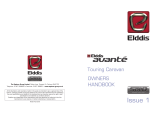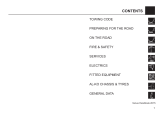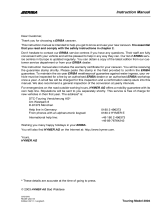Page is loading ...

1
FIGURE 1 FIGURE 2 FIGURE 3
QUALITY FOR LIFE
AL-KO AKS3004
STABILISER COUPLING
Service Information
Printed June 2010

2
FIGURE 1 FIGURE 2 FIGURE 3
QUALITY FOR LIFE
AKS3004 Stabiliser Coupling
1. Introduction
Read the operating instructions and act accordingly. Keep the operating instructions for general use.
Obey the safety information and the warnings on the device.
Important: This product is a safety component. Assembly should be carried out only by a qualified
repairer.
2. Safety Precautions Important operating information
The tow ball on the towing vehicle must be free of grease and other residue; otherwise the stabilizing
effect will be greatly reduced.
All AKS stabilizers must only be used with 50mm tow balls connected to the towing vehicle with
an anti rotation plate which does not allow the tow ball to unscrew or rotate.
Contact AL-KO for advice or supply.
If friction pads are contaminated with grease they should not be cleaned as this will have a
reduced stabilizing effect. Therefore friction pads should be replaced.
The AKS 2004/AKS 3004 should only be operated by one person when opening and closing.
Articulation:
Maximum articulation must not exceed ±20°vertically. Maximum articulation must not exceed ±20°
horizontally.
CAUTION: If these articulations angles are exceeded, components will be overloaded and the operation
of the assembly adversely affected!

3
FIGURE 1 FIGURE 2 FIGURE 3
QUALITY FOR LIFE
Please check the conditions for the attachment by following the
steps listed below:
Clearances for stabilizing handle (locking handle)
The area above the tow ball of the vehicle must be free from vehicle
components or attachments (e.g. vehicle overhang, spare wheel etc.) and
allow full function of the stabilizing handle.
3. Operating Instructions
Coupling handle (Figure 10 item1)
Stabilizing lever (Figure 10 item 2)
Preparation for coupling or uncoupling:
The stabilizing lever (Figure 11/2) must be in the uppermost position
(open) for coupling and uncoupling.
3.1 Coupling:
Ball coupling
Open ball coupling. To do this, pull the coupling handle (Figure 12/1) up in
the direction of the arrow. The coupling mechanism has an open position;
i.e. as long as the AKS 2004/AKS 3004 is not placed on the ball the
coupling handle will remain open. Put the opened coupling on the tow
ball of the towing vehicle. The coupling handle must now audibly click
back into the starting position.
In addition, press the hand lever (Figure 13/1) down by hand. Closure and
securing follow automatically.
AKS3004 Stabiliser Coupling

4
FIGURE 1 FIGURE 2 FIGURE 3
QUALITY FOR LIFE
WARNING: Coupling ball is correctly engaged when the green edge of
the safety indicator button (Figure 13/3) is visible.
3.2 Uncoupling
The uncoupling of the trailer from the towing vehicle takes place in the
reverse order: Pull the stabilizing handle right up to stop (top end position
of the stabilizing lever). Open coupling handle and lift the AKS 2004/ AKS
3004 from the ball on the towing vehicle. With bigger nose loads coupling
and uncoupling can be made easier by using a jockey wheel.
Please note:
The friction pads (Figure 14/1,2,3) are pressed against the tow ball and
generate a stabilizing/damping force. The friction pads are therefore
subject to wear. However, they are wear resistant and have therefore a
long service life.
3.3 How to check the efficiency of the stabilizing unit (lateral friction
pads)
Couple up AKS 2004/AKS 3004; to a standard 50 mm tow ball
Open stabilizing lever (figure 15/1)
Close stabilizing lever until resistance is felt (friction pads are in contact
with the tow ball but not yet under pressure)
If the arrow on the pressure plate (fig. 15/4) is before or on the marked
area (Fig. 15/2) the friction pads are still as new -A
The arrow on the pressure plate (15/4) should lie in the marked area on
the housing (figure 15/2 and 3) -B
If the arrow on the pressure plate reaches or passes the replacement
marking on the housing (figure 15/3) the friction pads are worn out -C
PLEASE NOTE: Adjustment of the friction pads is not possible.

5
FIGURE 1 FIGURE 2 FIGURE 3
QUALITY FOR LIFE
4. Servicing and Cleaning
4.1 Replacing friction pads (lateral friction pads)
This should be done when the arrow on the pressure plate has reached or
passed the “replace” marking on the housing (Figure 15/3).
Uncouple AKS 2004/AKS 3004.
Remove protective caps (Figure 16/1) with the aid of a screwdriver.
Press out the worn out friction pads (fig. 16/2) inwards and remove (use
punch and hammer).
Insert new friction pads from below with the pin in the sleeve and press in
as far as they will go. (Pin will engage no tools necessary). Re-insert shim
rings, if present.
4.2 How to check the wear of the brake lining of the friction pads
The brake lining of the AKS 2004/AKS 3004 friction pads are subject to a
certain degree of mechanical wear after high mileage. To show when the
friction pads are worn, a wear indica-tor is built into the handle (Figure
17/1).
Couple the AKS 2004/AKS 3004 onto the towing vehicle (do not activate
stabilizer unit). If a green indicator is visible (figure 18/2) then the AKS
2004/AKS 3004 is in a new condition or the wear of the ball and the AKS
2004/AKS 3004 is within permissible limits.
If only a red indicator is visible (Figure 19/3) then this can have the
following causes:
AKS 2004/AKS 3004 is not worn but the tow ball has reached its lowest
limit of wear ( 49 mm or smaller)
AKS 2004/AKS 3004 and the tow ball show signs of wear
Tow ball is in a new condition (50 mm) but the brake lining of the AKS
2004/AKS 3004 friction pads (Figure 14/2 and 3) show a high degree of
wear.
Establish the diameter of the tow ball so that conclusions may be drawn as to the wear of the
brake lining of the AKS 2004/AKS 3004 friction pads (ball diameter must not be less than 49 mm)
PLEASE NOTE: All maintenance work should be carried out by specialist workshops authorized
by AL-KO (Service Centers) or in accordance with the AL-KO Operating Instructions.

6
FIGURE 1 FIGURE 2 FIGURE 3
QUALITY FOR LIFE
Replacing the friction bearing bushing:
Always replace both friction bearing bushings!
AKS 2004 /3004 is uncoupled Remove lateral friction liners as outlined in
4.1
Pull the rubber buffer (Figure 20/1) up and off.
Press the safety indicator outwards and secure with SW 14 hexagon
spanner (Figure 20/2).
Remove cheese-head bolt (Figure 20/3).
Press brake lining recess (Figure 20/4) inwards and pull down and out.
Open ball coupling –pull coupling handling (Figure 20/8) up (open
position).
Remove countersunk head cap screw (Figure 20/5).
Press the friction pad (Figure 20/6) inwards with a screwdriver and remove
from the ball cup.
4.3 Important advice for maintenance and cleaning
The tow ball on the towing vehicle is to be cleaned of grease and other residue.
Suitable for cleaning:
Thinners / White spirit / Brake cleaner -otherwise the stabilizing effect will be severely reduced.
If friction pads are contaminated with grease they should not be cleaned as this will have a reduced
stabilizing effect. Therefore friction pads should be replaced.
The surface of the tow ball must be free of grooves, rust and seizing marks. Otherwise there will be
increased wear!
Please note: A torx spanner (T25/T30) is necessary for unscrewing items 3 and 5.
Fitting the friction pads takes place in the reverse order.
Tighten screws (Figure 20/3 and 5) with 5Nm.
Replace rubber buffer (figure 20/1) over the attachment profile on housing, first at the bottom and then at
the top.
Refit lateral friction liners again see 4.1

7
FIGURE 1 FIGURE 2 FIGURE 3
QUALITY FOR LIFE
Coated tow ball
Tow ball coatings (e.g. Zinc plated, Chrome plated, Dacromet,
lacquered, KTL or any other coating) must be removed with a 100-120
grade emery cloth, otherwise noise, excess wear, decreased
stabilizing efficiency or damage of the AKS 2004/3004 parts may
occur.
When using in extreme winter conditions, carefully spray the visual
indicator (coupling engaged) with defroster
4.4 Lubrication
Should lubrication of stabilizer unit parts become necessary then the
following must be observed:
Clean all parts thoroughly.
Areas may only be covered with a thin film of grease.
Type of lubricant: Multi-purpose grease.
.
Warning:
When lubricating no oil or grease should get on the friction area or on the ball holding area!

8
FIGURE 1 FIGURE 2 FIGURE 3
QUALITY FOR LIFE
5. Operation
5.1 Maneuvering:
For easier maneuvering (on campsites, etc.) pull the stabilizing lever right up.
The stabilizing lever may not be used as a maneuvering handle.
During opening and closing, the AKS 2004/AKS 3004 must only be operated by one person.
Press stabilizing lever down or pull it up with one hand only.
Never work with your foot or an extension. The components will be overloaded and damaged!
When opening or closing the stabilizing handle, do not leave your hand on the coupling handle!
Non-compliance means there is a danger of overloading the component parts.
5.2 Noises when driving
As a rule the friction pads of the AKS 2004/AKS 3004 do not cause any noise!
Any clicking, creaking, squeaking noises arising could come from the following causes:
Foreign bodies or dirt between the friction pad and tow ball.
Dry operation of the tow bar/tow shaft in the body of the coupling device.
Tow ball with coating (e.g. Grease, Zinc plated, Chrome plated, Dacromet, lacquered, KTL or any other
coating).
Remedial action:
Clean the tow ball and clean the friction pads by lightly rubbing over the linings with sandpaper (100 –
120 grain).
Lubrication of the coupling body through the grease nipples.
Type of lubricant: multi-purpose grease.
Go to specialist workshop. Have the ball holding areas checked for damage and the locking
mechanism for function. If necessary, change tow ball.

9
FIGURE 1 FIGURE 2 FIGURE 3
QUALITY FOR LIFE
5.3 Spare Parts
Spare parts are safety critical parts! For this reason when
fitting spare parts in our products we recommend the use of
original AL-KO Genuine parts or those parts that we have
explicitly approved. The reliability, safety and suitability of
parts designed especially for our products, has been
determined using a special test procedure. In spite of
constantly monitoring the market we are unable to assess or
vouch for other products.
Please bear in mind that repairs should only be carried out
by trained and qualified workshops/personnel.
To establish the correct spare parts the service centers need
the ETI number = spare part identification number on the
AKS 2004/AKS 3004, which is located on the front of the red
cover of the coupling head ( Fig 20 item 1).
All AKS stabilizers must only be used with 50mm tow balls connected
to the towing vehicle with an anti rotation plate which does not allow
the tow ball to unscrew or rotate. Failure to follow instructions may
result in serious injury.
Contact AL-KO for advice or supply.
/



